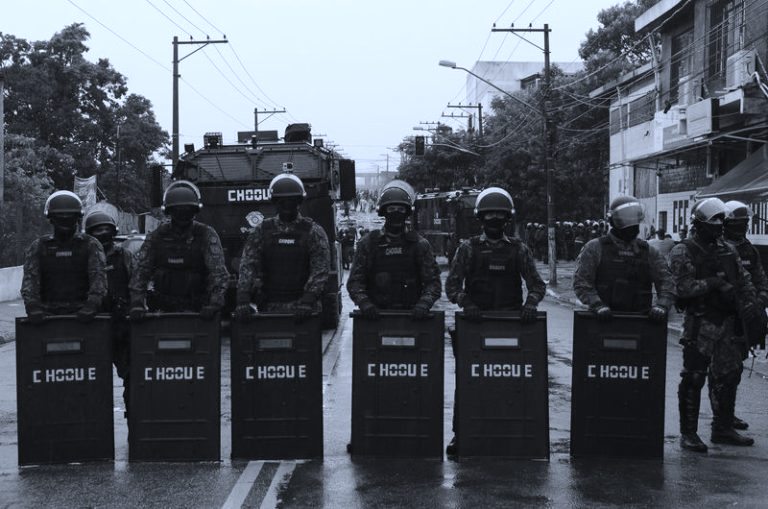FASE – one of Brazil’s oldest and most respective Non-Governmental Organisations, have published this bulletin on the current situation in the country.
Although Michel Temer’s government has brandished the old, worn out motto “Order and Progress,” day by day the country is undergoing a paradoxical combination of escalating repression against social movements with the mere management of disorder that boils down to insecurity for workers and constant denial of rights. The break with democracy in the wake of the inauguration of the unelected government has thus intensified a perverse combination of absence of social welfare policies with the presence of a state bent on repression, which generates even more exclusion for growing segments of Brazil’s people.

In his reflections on 2016, in the article “Managing Disorder,”¹ Jerome Roos, at the University of Cambridge, observed that “The management of disorder — this becomes the main paradigm of government under neoliberalism. Rather than directly confronting the underlying causes of political instability, ecological catastrophe or endemic social ills, the state of control considers it ‘safer and more useful to try to govern the effects.’ And so, instead of fighting the obscene inequalities of wealth and power at the heart of financialized capitalism, it increasingly resorts to policing the precariat. Instead of overturning the social exclusion and economic marginalization of historically oppressed minority groups, it has long since resolved to harass, murder and incarcerate them.”
We can make a direct link between that diagnosis and Brazil’s situation in early 2017, marked by the explosive breakdown of the country’s prison system and the brutal violation of the rights of people deprived of their freedom. Although Temer’s illegitimate government cannot be held responsible for decades of omission by States and the federal government itself, it has clearly made a strategic choice for policies that will intensify social exclusion. As economist Laura Carvalho explained in her article “Cut social spending and throw the money at prisons,”² “The option for ‘less state’ in economic and social policies, which is the underlying cause of the widespread escalation of objective and subjective insecurity in various countries, will lead to a need for ‘more state’ in terms of police and prisons.”
The outcome of this has been overcrowded prisons, most of which harbor black youth impoverished by the system. Those places are incapable of even keeping the prison population alive, much less offer them a way back into society. Recent data from the National Penitentiary Department shows that the number of people imprisoned in Brazil grew nearly 170% in 14 years. Brazil has the fourth largest absolute number of prisoners in the world, following the US, China and Russia. The Brazilian state’s obsession with incarceration refuses to recognize that there can be no structural solution to the problem unless the number of people in prisons is reduced. Of the country’s 630,000 prisoners, about 40% have not been tried. Meanwhile, public opinion widely values arbitrary forms of incarceration as a tool to fight corruption. Alongside the state’s inability to manage its prisons, the push to privatize penitentiaries is gaining strength. This has strengthened groups with economic interests in the expansion of repression and incarceration.

Since Temer took office, the logic of privatization has gained strength in several sectors. A recently enacted constitutional amendment to contain public spending, known as the “end of the world” amendment, enables an assault on people’s rights for the next 20 years. Along with that measure came the controversial reforms of social security and labor laws, opening the way for more widespread disorder, to be managed by an increasingly precarious and impotent state.
At the same time, ever since the wave of demonstrations in June 2013 there has been an extraordinary growth in the violence against sectors of the population that fight for their rights, as FASE and other pro-democracy organizations have frequently denounced. The mega sports events, like the World Cup in 2014 and the Olympic Games in 2016, brought with them more destructive forms of development as well as more repressive strategies and laws. Ever since, social movements have been increasingly criminalized.
The coup introduced even more setbacks. Bills to promote the violation of human rights have gained ground in the National Congress and several have been approved. In major cities, public safety is on the decline, homicides are on the rise along with victims of stray bullets, which tend most often to hit blacks and the poor, the rights of street people are under attack, etc. In the countryside, the Land Pastoral Commission (CPT) reports that the number of agrarian conflicts has reached the worst level in many years. In 2016, 59 people were murdered for defending Land Reform, whose implementation has been slow, and traditional lands. The situation is no different in the forests, with the spread of initiatives to market land to foreigners, make environmental licensing more flexible and promote the violation of traditional peoples’ rights.

Organizations committed to democratizing communication have denounced new setbacks to freedom of expression in Brazil. Both private and state repression and violence are escalating against indigenous peoples, women, blacks, the landless and homeless, young people, LGBTs, sectors fighting to defend public education and health, public employees whose rights are being cynically denied, and many others. The arrest of Guilherme Boulos, who coordinates the Homeless Workers’ Movement (MTST), during the eviction of 3,000 people in the Ocupação Colonial settlement in São Paulo, was just one more example of the offensive against people fighting for rights in Brazil.
In short, we are observing a perverse combination of disorder and repression, under a crumbling democratic state of law, which has become meaningless for much of the Brazilian population. We shall not, however, be intimidated but will continue to resist these assaults on democracy and to fight the current economic development model.
[2] Outras Palavras, Boletim 759, 19/01/2017.

